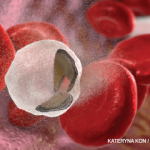It’s a system under “very tight regulation,” Dr. Torgerson said, with factors essentially holding the system at bay at various levels, such as factor H at the C3 level, and CD59 at the level of C8 and 9.
Defects in the complement system can lead to profound problems. People with a C1 deficiency have a 90% chance of developing lupus, Dr. Torgersen said. Those deficient in C2—the most common complement deficiency—have a 40% chance of developing lupus and require regular lupus screening.
Patients can be treated by replenishing complement via fresh frozen plasma, he said. Patients deficient in C1 inhibition could benefit from a recombinant C1 inhibitor. Eculizumab binds to C5, blocking the formation of the membrane attack complex. Its price is exorbitant, but it works well in patients who really need it, he said.
Phagocyte Compartment
Phagocytes, part of innate immunity, roll down the walls of blood vessels, sticking and releasing, sampling their environment as they go. When they encounter an infection, cytokines and chemokines are sent out by the tissue cells, essentially asking for help.
Dr. Torgersen calls phagocytes the Marines of immunity because neutrophils are then produced and crawl out into the tissue to the site of the infection and gorge themselves on bacteria or other invaders. After that, they throw up on themselves, as he put it, presenting what they’ve eaten on major histocompatibility complex cells in a display that’s arrayed like a hot dog in a bun to appeal to T cells and other immune cells.
People with deficiency in this compartment—causing adhesion deficiency, preventing phagocytes from sticking and rolling, or sticking down hard when there’s an infection to fight, or causing problems with phagocytes’ digestive ability—tend to get recurrent skin and soft tissue abscesses and chronic granulomatous disease.
Colchicine interferes with the formation of microtubules that neutrophils need to survive. And steroid treatment, although not specific to phagocyte function, acts as a brake so that neutrophils don’t migrate and function as well.
B Cell Compartment
B cells are like the Air Force of the immune system, deploying antibodies like cruise missiles, Dr. Torgersen said. They have a complex maturing process, going from immature cells in the bone marrow, then migrating to the periphery as they mature, then becoming fully mature as memory cells or plasma cells, factories, in effect, that produce antibodies, he said.
Patients on repeated treatments with B cell-depleting therapies, who are deficient in B cells or antibodies, can have recurrent infections, such as sinus infections or pneumonia.
